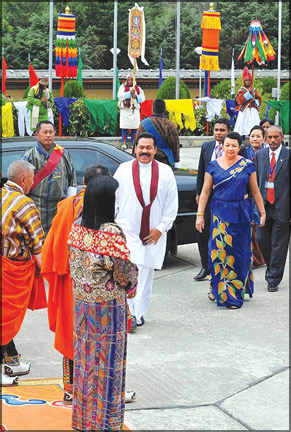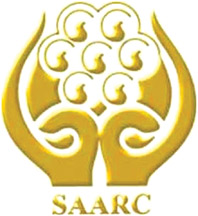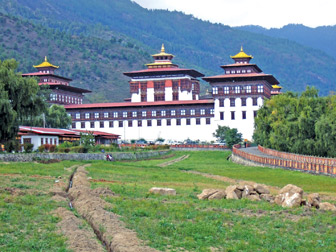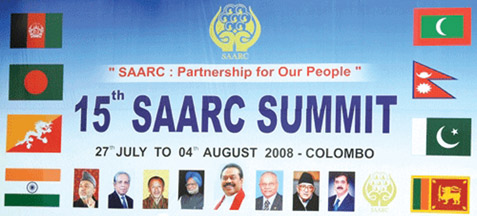|
SAARC celebrates Silver Jubilee:
South Asia marches towards peace, unity and prosperity
By Pramod DE SILVA
 |
|
President Mahinda Rajapaksa and First
Lady Shiranthi Rajapaksa being welcomed to the 16th SAARC
Summit in Thimphu. Pic : Sudath Silva |
 SAARC (the South Asian Association for Regional Cooperation) has just
turned 25. Having begun as a regional initiative in 1985 (the first
Leaders' Summit was held in Bangladesh that year), SAARC has traversed a
lot of ground over the past 25 years. This is certainly a watershed year
for the regional bloc, home to one-fifth of the world's population. SAARC (the South Asian Association for Regional Cooperation) has just
turned 25. Having begun as a regional initiative in 1985 (the first
Leaders' Summit was held in Bangladesh that year), SAARC has traversed a
lot of ground over the past 25 years. This is certainly a watershed year
for the regional bloc, home to one-fifth of the world's population.
Today, SAARC has eight members - Sri Lanka, India, Pakistan, Nepal,
Bangladesh, Maldives, Bhutan and Afghanistan, the latest member. It was
reported that Myanmar, already an observer, was also eyeing SAARC
membership.
Leaders of these eight countries, plus representatives from around
nine observer nations, met in Thimphu, Bhutan for the 16th SAARC Summit
on Wednesday and Thursday. Surprisingly, it was the first time that
Bhutan was hosting the Summit.
The Sri Lankan delegation was led by President Mahinda Rajapaksa.
Incidentally, the previous (15th) Summit was held in Colombo in August
2008 under President Rajapaksa's Chairmanship.
Twenty-five years on, SAARC has its fair share of critics and
detractors who are frustrated with the slow pace of regional
unification. There is some truth in their arguments, as SAARC leaders
themselves have turned the searchlight inwards and found that SAARC has
missed many opportunities for progress and further integration. The next
25 years should prove to be challenging to all SAARC nations in this
light.
In fact, the Thimphu Silver Jubilee Declaration has noted that SAARC
had not achieved its potential even 25 years after coming into being.
They have wisely decided to have a Vision Statement and set up a 'South
Asia Forum' for the generation of debate, discussion and the exchange of
ideas on South Asia and its future development. The Forum will consist
of eminent personalities of diverse backgrounds including from all SAARC
Member States. The Forum would provide inputs, based on a comprehensive
understanding, for charting out the future course of SAARC in the medium
and long run and recommend, if required, necessary improvements.
President Rajapaksa has rightly called upon SAARC not to hesitate to
build new structures and mechanisms to enable it to reach its full
potential.
Addressing the Summit in Thimphu, the President said, "Let us within
our own grouping be bold enough to introspect. We must take measures to
improve the existing mechanisms, through review, rationalisation and
reinvigoration".
After detailed deliberations over key issues like security, trade,
climate change, energy, food security, poverty-alleviation and disaster
management, the Summit issued a 37-Point Declaration - Towards a Green
and Happy South Asia, which spelt out a slew of initiatives to bring
about overall development of the region. This is perhaps the first time
that climate change figured so prominently (as the theme, in fact) in
the SAARC agenda. It is a sign that South Asia is serious about the
threat posed by climate change.
Firm resolve
The Leaders also strongly condemned terrorism and reiterated their
firm resolve to root out the menace. All countries in South Asia, bar
Bhutan and the Maldives, have faced terrorism in one form or the other.
Only Sri Lanka has emerged triumphant in the battle against terrorism
and it has a lot to offer to other South Asian countries in terms of
dealing with the problem.
 |
|
Thimphu, the city where
this year's summit took place |
The countries reaffirmed their commitment to implement the SAARC
Regional Convention on Suppression of Terrorism and its Additional
Protocol and the SAARC Convention on Narcotic Drugs and Psychotropic
Substances. The two may not seem to be related, but most terror groups
are known to engage in drug trafficking.
Another significant outcome was the establishment of the SAARC
Development Fund (SDF) which was proposed in Colombo. It became
operational from Thursday with its formal launch at the sixteenth
summit. The permanent secretariat of the fund will be based in Thimphu.
The SDF, like the IMF and ADB, will serve as a regional funding
mechanism to fund various social, economic, and infrastructure projects
in the region. The Fund has an authorised capital of SDR (special
drawing rights) one billion. This was a long-felt need for the SAARC
region, which should strive to be self-reliant for development.
SAARC has failed to move ahead in intra-regional trade, despite the
existence of several trade treaties and bilateral trade pacts between
various Member States. Moreover, SAARC as a bloc makes only a minimal
contribution to world trade. This situation should change. After all,
SAARC itself has a huge market close to 1.5 billion people. We hope the
"Bilateral Trade and Services Agreement" signed at the 16th Summit would
be an impetus for trade activities in the region.
'Trade not aid' should be the formula for SAARC as it seeks to uplift
the living standards of the South Asian people. In this context, poverty
alleviation should remain a key goal of SAARC.
The Leaders have emphasised the importance of deepening regional
efforts on poverty alleviation and called for the expeditious
mainstreaming of SAARC Development Goals at country level. As President
Rajapaksa pointed out, taking economic progress beyond statistics to
reach the village level where most South Asians live was vital.
One of SAARC's biggest problems is the lack of a South Asian identity
and people-to-people contact. If I can think of myself as South Asian,
instead of thinking as a Sri Lankan or an Indian, half the battle would
have been won. Unfortunately, this is not the case. SAARC citizens, if
they can be called such, require visas even to visit their neighbouring
countries. SARRC has to empower its people first in more ways than one.
The lack of free movement of people and goods is a huge dent in the
SAARC concept of regional unity. True, even the European Union took a
long time to become a borderless entity, but SAARC should at least now
move in that direction. Apart from borderless travel, South Asians would
like to see more transport options between at least their key cities.
Many SAARC capitals are still not linked to each other by air, so
intra-regional travel and tourism is still in its infancy despite the
best efforts of governments. It should also expedite work on the
proposed Asian rail network at the SAARC end.
The SAARC region should also explore the possibility of issuing a
common visa for tourists from other regions, a move which will benefit
all eight nations. Expansion and openness should always bring progress
and prosperity.
 |
|
A board announcing the
15th SAARC Summit held in Sri Lanka in 2008. |
And why not a common currency? This is very much a long-term concept,
but an interesting one. This should be a distinct possibility as South
Asia integrates its economy further.
Bilateral disputes
SAARC cannot progress unless some of its Member States resolve their
bilateral disputes which have dragged on for several decades. They do
pose a problem for the prospect of peace in the region. Peace in the
SAARC region is vital for its political and social stability and
development. It is only then that the outside world will treat SAARC as
a force to reckon with. As long as the region is mired in conflict, as
long as it is affected by terror, as long as its people do not embrace a
South Asian identity, SAARC will not realise its true potential.
Ultimately, it is SAARC itself that should evolve solutions to its
problems. President Rajapaksa and other leaders have urged a search for
South Asia's own home grown solutions to current and future problems.
This does not, of course, mean that SAARC can progress in isolation.
SAARC must strengthen its ties with the observer States and other
regional blocs and raise its collective voice in international fora.
SAARC must become one, in spirit and in deed. |

